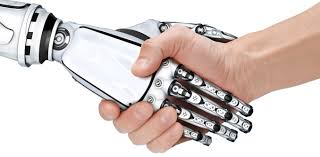As a mathematician, my field of research rarely brings me into contact with controversial ethical topics. However, recent developments in the area of Artificial Intelligence (AI) threaten to alter the neutrality of my profession. AI refers to complex computer algorithms designed to act or mimic human behaviors such as learning or pattern recognition.
Like most technical buzzwords, AI has received more hype in recent years than it deserves (modern society is notorious for overplaying new technologies). Nonetheless, AI is a powerful new tool that will change the way humans learn, work and play. The technology also raises a host of ethical questions: “Can consciousness be replicated?”, “Do computers have the same rational capacity as humans?”, etc… As the field of AI develops, the faithful will look to the Church to provide clarity regarding this new technology. While the Church’s teaching will potentially strike controversy, it will ultimately be a light in the darkness for those who are seeking answers to the age-old question of what it means to be human in a fast changing technological world.
In early December, the Vatican hosted a conference entitled “Power and Limits of Artificial Intelligence” which brought together technical experts to discuss the emerging area of Artificial Intelligence. Members included the renowned author Stephen Hawking, as well as executives from Google, Facebook and other leading companies in AI development. The conference sought clarification of some of the ethical issues connected with new technologies that can replicate or even exceed human performance. In the words of the Conference, “Major research is underway in areas that define us as humans, such as language, symbol processing, one-shot learning, self-evaluation, confidence judgment, program induction, conceiving goals, and integrating existing modules into an overarching, multi-purpose intelligent architecture.”
A key topic the conference tackled was that of computers replacing humans in the workforce. Computers have been around for some time now, and the notion of automation is nothing new. For example, economies of scale make manufacturing cars at giant factories with cutting edge robots much more profitable than the traditional method of by-hand production. What is new is the idea that robots will replace not only so-called blue-collar jobs, but white-collar ones as well.
A study conducted by Citi and Oxford, released January 2016, predicts that 47% of jobs in the U.S. will be replaced by computer automation. Other countries will be hit harder, however, with a projected 87% of jobs being replaced in Ethiopia, 77% in China and 65% in Argentina. Rome is concerned about the humanitarian impact this loss of jobs will have on society. In the words of the Conference, “Unless channeled for public benefit, AI will soon raise important concerns for the economy and the stability of society. We are living in a drastic transition period where millions of jobs are being lost to computerized devices, with a resulting increase in income disparity and knowledge gaps. With AI in the hands of companies, the revenues of intelligence may no longer be redistributed equitably. With AI in the military, we may witness a new and costly arm race. While intelligent assistants may benefit adults and children alike, they also carry risks because their impact on the developing brain is unknown, and because people may lose motivation in areas where AI is superior.”
The Conference acknowledged deeper philosophical issues related to AI, but claimed that the technology is still nowhere near creating a computer replicating human rational functions. As Yann LeCun the first director of AI research at Facebook said, “Frankly these are questions that we are not worried about right now because we just don’t have the technology that’s anywhere near the kind of power that’s required. So these are philosophical discussions but not immediate problems.” For believers, some questions are easy to answer. Can a computer program be created with the same dignity as a person? The answer is no. Man is created in the image of God, and no snazzy algorithm will be able to truly replace the soul of man.
AI promises to be an incredibly useful tool that, if used properly, can enhance our lives tremendously. As the Conference stated in its closing remarks, “The value functions that AI is asked to optimize require special attention, as they may have unexpected biases or inhuman consequences. Just like crash tests for transportation, the passing of ethical and safety tests, evaluating for instance social impact or racial prejudice, could become a prerequisite to the release of AI software.” Ultimately, like any technological tool, AI is neutral; it is up to the human users to decide if it will be a force for good or for evil.
Apart from being a practicing Catholic, Patrick has a Bachelor’s in Mathematics from the University of New Mexico, and is a Master’s of Science candidate with a concentration in Statistics also at UNM. Patrick is a grant reader, and has taught introductory statistics. He also has professional experience in software development and computer modeling

